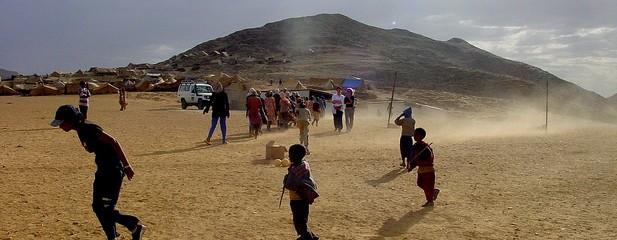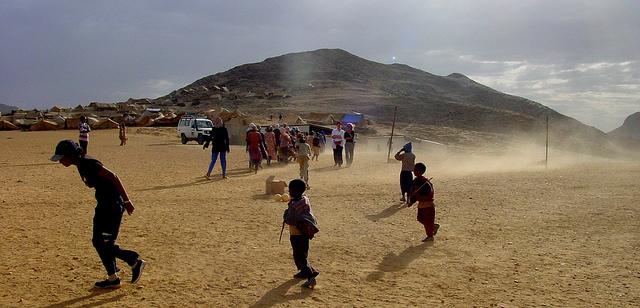Why the skirmishes between Ethiopia and Eritrea won’t spiral into full-scale war

There is fighting talk on both sides, but neither would benefit from actual war.

At a refugee camp near the Eritrea-Ethiopia border. Credit: Roberto Maldeno.
International attention has once again been drawn to the fraught relationship between Ethiopia and Eritrea, with both sides admitting that the recent flare-up of armed conflict on their shared border resulted in “significant casualties”.
The border between the two countries remains heavily militarised, with a no-man’s land between the two armies. However, reconnaissance units from both sides – as well as refugees and deserters from the Eritrean side – often cross this “no-go” area. It is possible that the 12 June fighting was triggered by any of these movements, though it seems the Ethiopian military acted in an unusually robust way. Either way, the incident has since been followed up by strong words on both sides.
When these two countries went to war between 1998 and 2000, tens of thousands from both sides died. Could this latest skirmish spiral into another full-fledged war?
A difficult history
Ethiopia and Eritrea have profound historical and cultural ties. But they also have separate histories – which the political classes of the two countries play up or down depending on their political aspirations – particularly around the fact that Ethiopia remained independent while Eritrea was colonised by Italy from 1891-1941 and was subsequently under British rule from 1941-1952.
In December 1950, the United Nations General Assembly voted in favour of granting Eritrea autonomous federal status under the sovereignty of the Ethiopian Crown. This was in line with the aspirations of a segment of the Eritrean population, but another section of society was vehemently opposed. Eritreans were not given the opportunity to vote on the issue, however, so it is difficult to determine which side had greater popular support.
Nevertheless, the ongoing federal arrangement proved unsatisfactory to both unionist and separatist segments, and it was abolished in 1962 when the Eritrean parliament voted for total union with Ethiopia.
This decision went directly against the desires of the pro-independence Eritrean elite, who claim the vote was the result of interference from Emperor Haile Selassie. In the aftermath of the decision, a “liberation struggle” was launched. This turned into a liberation war which – combined with the civil war waged by various Ethiopian groups to unseat the military government in Addis Ababa – brought untold misery to the people of both countries.
Challenges of disentanglement
These wars ended in May 1991 when the Eritrean People’s Liberation Front took control of Eritrea and Addis Ababa fell to the Ethiopian People’s Revolutionary Democratic Front, which has been in power ever since.
The two rebel forces agreed that the Eritrean question for independence would be settled by a referendum to be organised within two years. But important terms of cessation were neither discussed nor agreed before the vote. These included issues such as commodity trade, use of Eritrean ports by Ethiopia, the question of citizenship of people of Eritrean origin in Ethiopia, and the precise border between the two countries. When the referendum was held in April 1993, the terms of the divorce had thus yet to be agreed.
Nevertheless, Eritreans voted overwhelmingly in favour of independence, which Ethiopia recognised immediately. Eritrea now had de jure independence, but continued to use the Ethiopian currency the birr, and the two economies remained closely interlinked. However, there was no clear official articulation or even exchange of ideas on a host of issues such as how to resolve problems resulting from differences in national economic plans, questions over exchange rates, and harmonisation of external customs.
As a result, the political and business class in each country felt that the relationship was lopsided in favour of the other side. In the midst of this state of mutual bitterness, Eritrea issued its own currency, the nakfa. But again, the two sides had not agreed on how to handle the implications of this on the economies of each country. Tensions rose to a new high.
Haphazard solution to the 1998-2000 war
This is the climate in which Eritrea invaded Ethiopian territory in 1998, sparking war. To the Eritrean government, it appeared that the ruling party in Ethiopia was in a vulnerable position. It ran a poor, vast, diverse country with a history of strife along various cleavages.
The 1998-2000 conflict was lazily framed as a “border war” by the international community and media. But whatever one calls it, it took the lives and limbs of tens of thousands of people from both countries.
The war finally ended with the Algiers Peace Treaty. This was signed after Ethiopia had regained all the contested territories and penetrated deep into Eritrean territory, but unfortunately the parties and mediators that facilitated this agreement took a purely legalistic approach to resolving the conflict. The real underlying causes of the conflict were swept under the carpet, and the focus was on determination of the boundary between the two states – the most superficial of the causes of the conflict. Each side won and lost some territory.
Significantly, Badme, the flashpoint for the war, was awarded to Eritrea, yet Ethiopia still holds the town and its environs.
The situation now
Better explanations of the conflict today refer to the complete absence of trust between the protagonists, a fear of accountability, and the lack of vision and resolve to move forwards.
Additionally, some point out that the defence of Eritrea’s sovereignty seems to be the only claim to legitimacy left to the ruling party. Its interest seems to be in perpetuating the status quo. And in any case, it seems the goverments in both Eritrea and Ethiopia have settled for outliving the other side as the only solution.
That implies each side has to work assiduously to shorten the lease on power of the other. But that said, neither side has any interest in starting a full-fledged war. The Ethiopian government does not want a war that could potentially reverse the country’s economic gains. Meanwhile, the Eritrean government knows it is in a much weaker political, economic and diplomatic position than it was during the last war.
Hence, the choice for the Eritrean government is to sponsor every group battling the Ethiopian government, while Ethiopia mainly relies on diplomatic and economic isolation of Eritrea.
This is not a good outcome for either side, but it is highly unlikely that the recent incidents will spiral into a large scale military confrontation. Neither side believes it would gain if they did.
Seyoum Y. Tesfay is an Assistant Professor at Addis Ababa University.
This article was originally published on The Conversation. Read the original article.![]()





Bull crap! This clown either does not know the whole story or he is stupid and opportunist! What an idiot!
where did he buy his degree this stupid woyane thug?
This is the most levelheaded and objective analysis of the current state of Ethio-Eritrea tensions I have read (compared for instance to the one-sided pieces one sees on Horn Affairs and the very biased article by Michaela Wrong in foreignpolicy.com). The only thing I would add on to the author’s piece would be 1/2 factors pertaining to the domestic Ethiopian political scene, which would also suggest that it is very unlikely that Ethiopia would opt for all-out war against Eritrea. For e.g. the fact that the current PM and the ruling are still engaged in a consolidation and balancing process several years after the passing of the former PM. As for Roberta’s comments, the less said, the better.
thieves always they fight when they share.
This Ethiopian Dictators Woyane They have to go . Wake up Ethiopians Army don’t fait for nothing my brothers and sisters. Peace
Dear Sir,
disagreeing with the logic you framed your argument, conclusion you come up is strongly wrong!
Would you reinvestigate the real cause why the Eritrean side pesters the other counterparts including Ethiopia?
Now, the leadership in the 100 million’s land is getting coerced to own the right doctrines and go on ways handling the problem, “concentrate on more economic upheaval than taking time and energy on a lengthy border clashes”. The massive grass root is well learned now and can check the proper track partners in Addis Ababa need to go. The time of dominance no more now than it had been before.
The Eritrean side could be miscalculating, and being misled by own selves’ only thinking, “prefer continue the skirmish at border level”.
On the ground, Ethiopia is becoming the heavyweight among the African folks economically, militarily, diplomatically, …. The next step could be the Eritrean Regime be punished to behave like a small kid who troubles own whole families.
I am actually impressed by how impartial Assistant Professor Seyeom Tesfay attempts to be in his article. I wish we had a thousand of you on both sides of the border because intelligent and rational people tend to come up with solutions that does not require death in most cases. While I may not agree with some of the fact and I do agree with the conclusion of the argument. Please continue share more of your views and lets hope some of the clowns that seem to be trolling the web can learn a few things from your approach.
Personally I would advice anyone 2 be logical before opening their mouths 2 make a point. Dear Ethiopian Prof. I agree wiz ur conclusion that a war between z two ‘Very Poor’ countries won’t benefit either side. However I don’t agree z premise u took for supporting ur conclusion. U need 2 get ur facts right! Don’t forget that there is always 2 sides of z story Professor! I would recommend both countries 2 stop stealing from their own people and buy properties in z West! Rather think like a western leader and plan a prosperous future for their people.Otherwise we will not prosper any time soon. Don’t joke with lives!!!
It’s refreshing when you start reading a levelheaded articles like this coming from Eritrea or Ethiopia. It’s usually emotion driven that fact driven. Your effort is applauded sir. Looking forward to reading more on your views.
Indeed, this is very well written, balanced article I have read. I level through the DERG era, when EPLF & TPLF fighters fought side-by-side as brothers & sisters.
What is true however is that, Ethiopia will not rest until it (by peace or force) have port access…and Eritrea will never survive without Ethiopia’s economic ties. Eritreans privately love Ethiopia but pretend they don’t, publicly. In the end, millions of Eritreans who wished for peace & harmony aren’t getting it. Ethiopians on the other hand are freely enjoying their economic power in the containment. Many on the outside world don’t clearly & fully understand Ethiopians. What Ethiopia is doing is no war, no peace is effective to weaken the Eritrean government & it has been effective. Beside a few arab governments, the Eritrean government has no friends. He’s tactics to support arm groups to destabilize Ethiopia has failed for 20 years now. Last year, 30,000 fighters who were trained by Eritrea to fight Ethiopia made secret deal with the Ethiopian government & were welcomed by Ethiopia join Ethiopia. Without Eritrea known, those fighters were assisted to across into Ethiopia via Sudan & it was a big blow to the Eritrean government. Additionally, the current prime minister of Ethiopia has made it clear to Eritrea. Whenever, Eritrea fires on Ethiopian troops, Ethiopia is to heavily respond. Just what Ethiopia did last weekend. When Eritrean troops fired on Ethiopian troops, the Ethiopian military heavily responded to send clear message to Asmera!
In the end, both sides need to set down workout their differences and be good neighbors. Eritrea’s economy depends on Ethiopia & Eritrea can earn billions of dollars just from the port fews alone. If Eritrea wants to live in peace & be a good neighbor, peace is upon its hands. Eritrea is a joke to try to compete with the Ethiopian military. Eritreans need to understand Ethiopia is not like the DERG ERA! No African military will dire to mess around Ethiopian military.
Thanks to Professor Seyoum for his clear short contributions about the two countries nightmare. The questions was always what was the contribution of England and Italy prior 1891 QPSYT “particularly around the fact that Ethiopia remained independent while Eritrea was colonized by Italy from 1891-1941 and was subsequently under British rule from 1941-1952”. That is one hot potato world scholars like Professor Seyoum and the rest of the world don’t want to touch/discuss/address. The local broker AKA Sultan Ibrahim sold Assab in 1869 to Italian shipping company that transaction was set up by the Italians with the blessing of the Royals in England to make sure Italy gets that side of the Red Sea so that they don’t disturb the their royal Jewel Egypt. Most of the crime was created & committed to have peace between the two colonies Italy and Brits then France. What was the base to think decide there was two countries before 1891 , if there was ? what was the border pinpoint line, who was the seating/ruling party parliament/royal gov. body anything give the right to Eritrea a full independent country. If we Ethiopians and our brothers and sisters Eritreans wants to get into the bottom of our man made/Italian made artificial problem we need to stop lying to each other start beyond 1891 , ignore the US and EUE and the Arabs, look the East and West German, look Tanzania before and after , remove (Essays Afework- Essays created this wild unpleasant-unwarranted-unnecessary –untruth theory Ethiopia colonized Eritrea with him being in power these people will never get peace Essay was born, raised and graduated with a natural hatred-betrayed, selfishness, to his brothers and sisters he choose to be a villain long time ago it’s too late for him to think about peace he has a LOT-LOT-LOT of blood on his hand its like a serial killer why stop killing) talk to the new Generation of Eritreans and Ethiopians , remove all restriction let both country have a free borderless trade agreements that influence business, assess the opportunities and problems facing the two countries come up a temporary solution which can be renewed every ten twenty years , remove all fire power from the border except a few border patrol on both side to keep the peace this two family don’t deserve to kill each other we are one people who did take a poison pill for the last 200 plus years from the so called civilized world, friends , partners , responsible parties, peace keepers on and on……….the truth they all are crocodile tears sign holders who are hypocrite , if you are OK unifying Germany why not Ethiopia and Eritrea –these two country suffer from luck of self-awareness. If they only know how much powerhouse they can be if they decide just seat and talk like our grandfathers did thousands years ago , we have more similarity than differences including kindness –forgiveness- loyalty – toughness ..however until we STOP taking money from other countries to criminalized each other-to be used as a temporary political victory tools forget about similarity we always point finger at each other that exactly what el-duce-Mussolini and others injected us with 200 plus years ago . We have to take out the poison or suffer through the pain for a long time. Historians professors Government officials from Ethiopia and Eritrea need to start dialog with reality on the table hide and seek will not work in the 21 century.
Hailue
Professor Seyoum says “This is not a good outcome for either side, but it is highly unlikely that the recent incidents will spiral into a large scale military confrontation. Neither side believes it would gain if they did.” But he never could explain why Ethiopia and Eritrea went to war in 1998 and 2000. What “good” came out of the war a decade and a half ago? First thing to not forget is that war is almost always irrational. But I have my suspicions why the professor would go off on a limb to make such an irrational statement. It is that he is “ruling party scholar” with privileges to security information.
The reality is that Ethiopia can’t make any independent decision pretaining to Eritrea. So the idea that both can sit down come to some kind of agreement is an not realistic. They did try Eritrea Ethiopia algiers agreement 2000.
I am 100% sure the Ethiopian and Eritrean both want to live peace; however if one can not make once decision it is almost impossible to get there.
Ethiopia pride its self of being the only nation in the world to have never be colonized which is true and we all are proud of that…well don’t start now.
Ethiopia is the oldest and maturest country with wealth of wisdom has to choose either live with peace with its neighbor or please its MASTERS.
“Nevertheless, the ongoing federal arrangement proved unsatisfactory to both unionist and separatist segments, and it was abolished in 1962 when the Eritrean parliament voted for total union with Ethiopia.”
Really? Where did you get this professor?
How do you explain that the same members of parliaments who voted in favour of union including the first president of Eritrea joined the armed struggle some years later?
The fact of the matter is that the members of Parliament were coerced and a gun put to their head to vote to abolish the parliament. The article has factual errors that you would not expect from a layperson let alone the professor.
Dear all,
I would like to thank you for taking time to read and comment. Particularly, I appreciate the kind words of TMT, truth, Truth Seeker, Z-Mike and Andy.
Regarding those that have issues with the article all I can say is that this is only one person’s viewpoint. I make no claim to absolute truth.
Best wishes,
The recent skirmish will not develop to full scale war because Ethiopia is not want to. Eritrean government has tried to provoke ethiopia and engage to an endless havoc and ethiopia continue to avoid . By doing so , ethiopia has benefited tremendously diplomatically and also is able to engage itself on economic growth.
Eritrea is interested on the war because it will divert the COI findings of human right abuse in eritrea , the war will also justify for them for the military conscription.
The article therefore failed in trying to make Eritrea as an actor of avoiding the war.
Inefficient government from both sides and hater people from Eritrea specially the youth.
Both government knows about guerrilla fighting and killing people: nothing else! Politics, good governance, development needs leaders who have the decency, knowledge, ethics…..at least a common sense. Most of our Ethiopia and Eritrean leaders do not have those basics unfortunately.
Thank you to Professor Seyoum as a professor of Addis Ababa University I know for sure you cannot be biased towards both countries . However out of the class your opinions matter . Some of the people who like to paint the professor as one sided Ethiopian advocate is flat wrong. He alone has a much better understanding than average/most of us –because what he does explain/write reflect things as they appear to his profession which is teaching. The question the discussion the opinion should be what can be done to bring peace , stability between Ethiopia and Eritrea not accusing or harassing Seyoum.
Thanks again for your well-adjusted manner keep teaching/writing.
Andy Hailue-CA
Dear Danu
who is the Ethiopian masters? Ethiopia’s problem has been not taking order from any one. I don’t have any clue if you are Ethiopian; to use the word MASTER is like God is from England no body believe you, get your story straight. Ethiopians love, Respect, and care foreigners when they behave as A human being , when they don’t act like one -we go to war, we kick them out, we don’t bowed to any color, status that is why Theodor’s II pay the price with his life instead of bowing to the Queen of England . that is the reason a few good man and women escort the Italian war machine from Northern Ethiopia , that is the reason the Southern part of Ethiopia fight with Arab dictators in the South. Ethiopia has been one country to be known defend itself from Arabs and European invaders rulers mid of 1700 to middle of the 1900 . Yes we have a lot of King want to be throughout our history acting on their own behalf to create a territory of their own, regardless the main goal has been and will be fighting on behalf of Ethiopia, for the unity of Ethiopia and the Ethiopian people. We Ethiopians has one similarity with the people of the united states of America “ Out of many one” One nation .
Masters-wow YES Ethiopians are known to bowed to their gust , friends, visitors , family, even to a stranger …Not out fear or thinking he or she is Better, bigger, richer than us we just are kind and accommodative , that should not been seen as bowing to our masters. If Essays try to revoke Ethiopia ONE MORE TIME –The central government in Addis should unleash whatever they got at their disposal ; we cannot bleed for over 60 years due to crazy mad man illusion. Enough is enough?
Thanks
cialis pills cialis 20mg